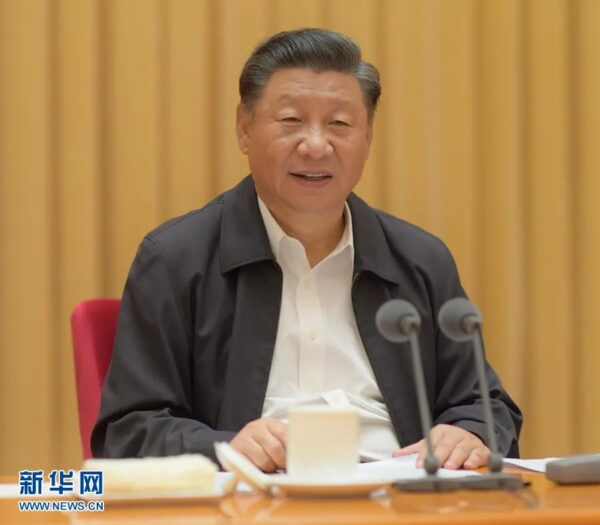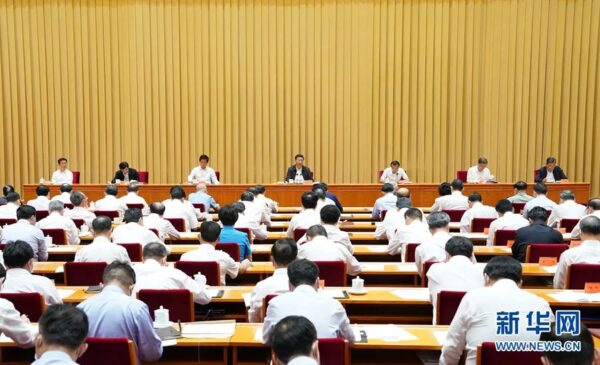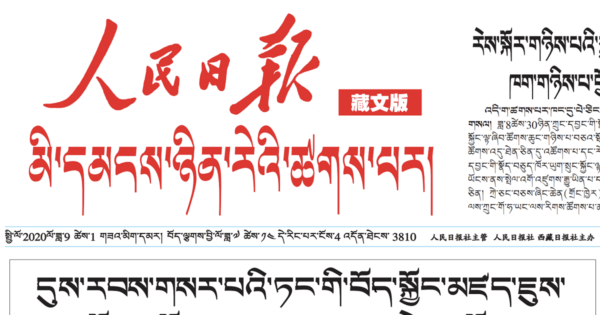The seventh Tibet Work Forum held in Beijing from Aug. 28 to 29, 2020 and presided over by China’s top leader Xi Jinping indicated the Chinese leadership’s decision to continue its policy of absolute control and assimilation in Tibet.
Chinese state media reported that Xi laid out a “strategy of governing Tibet in the new era” that includes “Sinicization” of Tibetan Buddhism and improving the ability of Chinese Communist Party organizations and members at all levels “to deal with major struggles and prevent major risks.” There was considerable emphasis on ensuring “national security” and “ethnic solidarity.”
As with the previous Tibet Work Forum meetings, the entire politburo standing committee attended, indicating the meeting’s special significance.

Xi Jinping addressing the seventh Tibet Work Forum in Beijing.
Even as Xi claimed success in China’s Tibet policy, particularly since the 18th Congress of the CCP in 2012 where Xi took over as China’s leader, his statement to party officials that their work in Tibet must be “on maintaining the unity of the motherland and strengthening national unity” suggests that there is a growing realization that the CCP has failed to win over the Tibetan people.
In fact, Xi specifically said “It is necessary to carry out in-depth education on the history of the party, the history of New China, the history of reform and opening up, and the history of socialist development, and the history of the relationship between Tibet and the motherland, and guide the people of all ethnic groups to establish a correct view of the country, history, nationality, culture, and religion.”

A view of delegates attending the seventh Tibet Work Forum in Beijing
Xi called for a patriotic re-education of the younger generation of Tibetans, asking the officials to look into “strengthening ideological and political education in schools, put the spirit of patriotism throughout the entire process of school education at all levels and types, and plant the seeds of loving China in the depths of the hearts of every teenager.”
CCP priorities
The following are some of the CCP’s priorities for Tibet raised in the meeting, according to state media reports.
- Ensure national security and enduring peace and stability, “steadily improve people’s lives,” maintain a good environment, solidify border defense and ensure frontier security
- Focus on safeguarding national unity and strengthening “ethnic solidarity”
- Strengthen the building of leadership teams at all levels, cadre teams and primary-level party organizations in order to improve the capacity to respond to “major struggles” and prevent “major risks”
- Education and guidance should be provided for the public to mobilize their participation in “combating separatist activities,” thus “forging an ironclad shield to safeguard stability”
- “Patriotism” should be incorporated into the whole process of education in all schools
- Tibetan Buddhism should be guided in adapting to socialist society and should be “developed in the Chinese context”
- Build a new modern socialist Tibet that is “united, prosperous, culturally advanced, harmonious and beautiful”
- Offer increasing support to Sichuan, Yunnan, Gansu and Qinghai provinces in their Tibet-related work
- Conserve the ecology of the “Qinghai-Tibet Plateau” [which is a Chinese government way of referring to the Tibetan Plateau]
Tibet Work Forums
This the second time such a work forum on Tibet took place under Xi. The previous sixth Tibet Work Forum took place on August 24-25, 2015.
The first Tibet Work Forum was held in 1980, followed by meetings in 1984, 1994, 2001 and 2010.
These meetings have turned out to be important policy-making venues. The third Tibet Work Forum in 1994 set the hardline policies on Tibet that are still in place today, including severe control on religious activity and campaigns against the Dalai Lama and “Dalai clique.”
The recent visits to Tibet by Wang Yang, chairman of the Chinese People’s Political Consultative Conference, and Wang Yi, state councilor and foreign minister, along with the National Security Meeting held in Lhasa at the end of August, all seem to have been preparation for this Tibet Work Meeting. Many of the themes touched on by TAR Party Secretary Wu Yingjie at the TAR National Security Meeting appear in Xi’s statement at the work forum.
Border conflict with India
Xi’s urging that officials “must coordinate the domestic and international situations” and “strengthen the construction of border areas and adopt special support policies to help border residents improve their production and living conditions and solve their worries” might be an indication of the situation in Tibet arising out of the current India-China conflict.
Foreign Minister Wang Yi, during his visit to Tibet, was reported by state media to have traveled to an unidentified border region. In his remarks, Xi reiterated his policy formulation, “We must adhere to the strategic thinking that to govern the nation, we must govern our borders; to govern our borders, we must first stabilize Tibet.”
If Xi’s call for winning over the hearts of the Tibetan people was connected to the ongoing conflict with India, then the situation has been further heightened by reports appearing in the Indian media on September 1, 2020 about India’s deployment of a paramilitary force composed mainly of Tibetan refugees to confront Chinese troops in the border area of Pangong Tso (Lake), located between Tibet and the Indian state of Ladakh.
Tibetan areas outside the TAR
Continuing the policy established at the fifth Tibet Work Forum in 2010 of including Tibetan areas outside the Tibet Autonomous Region in their consideration, Xi told this year’s meeting that support will be increased for Tibet-related work in the four provinces of Sichuan, Yunnan, Gansu and Qinghai, all of which include Tibetan areas. The first four work forum meetings focused on the TAR only.
In addition to central party leaders, the meeting included participation by leaders from the National People’s Congress, state councilors, the Supreme People’s Court, the Supreme People’s Procuratorate, and the Chinese People’s Political Consultative Conference, state media reported.
Officials from the TAR, as well as from Sichuan, Yunnan, Gansu and Qinghai provinces, also attended. In addition to political leaders, officials from relevant financial institutions, state-owned enterprises and military units attended the meeting, state media reported.
The policy of including Tibetan areas outside the TAR in the discussions at the Tibet Work Forum indicates that the Chinese leadership realizes the Tibetan issue cannot be considered solely under the politically mandated rubric of “Tibet.” The 2008 pan-Tibetan demonstrations that spanned all over the Tibetan Plateau opened the eyes of Beijing to this fact.
That could be one reason why the 2010 Tibet Work Forum included all Tibetan areas and why the areas outside the TAR began to see stringent political controls even though China does not consider them to be part of “Tibet.”

Front page of the People’s Daily issue of September 1, 2020 with Tibet Work Forum as the main story.
Early Tibet Work Forums
The first Tibet Work Forum took place in Beijing from March 14-15, 1980. The General Secretary of the CCP Central Committee Hu Yaobang chaired the forum, and TAR officials reported their work to the secretariat of the Central Committee. The meeting’s “Minutes of the Tibet Work Forum” said that the central task and goal was “to focus on Tibetan cadres and Tibetan people, and strengthen cadres of all ethnic groups.”
In May 1980, Hu went on an inspection tour to Lhasa and expressed his disappointment at the lack of improvement in Tibetan people’s lives. He also announced measures to help the Tibetan people and to make them take the lead in governance by withdrawing most of the Chinese cadres posted there.
The second Tibet Work Forum was held February to March 1984. On March 28, 1984, the meeting adopted the “Minutes of the Tibet Work Forum.” The second forum led to the system of “aid projects’ in the TAR, with 43 development projects outlined.
Both the first and the second forum were during the time when moderate Hu Yaobang was the CCP general secretary.
The Third Tibet Work Forum was held in July 20-23, 1994 and marked an official end to moderate policies that gave preference to Tibetan culture and religion and to an increasing role for Tibetans in government and the economy. The forum resulted in a dramatic increase in political repression: it led to tighter internal security, longer sentences for political offenses, increased control over monasteries and nunneries, intensified political education in schools and more detentions.
The forum identified the influence of the Dalai Lama and the “Dalai clique” as the root of Tibet’s instability. Officials at the third work forum described the Tibetan independence movement as a snake, and their attempts to “cut off the serpent’s head” led to restrictions of the spread of Buddhism and a political campaign to destroy the religious as well as the political standing of the Dalai Lama.
Later work forums
The fourth Tibet Work Forum was held in Beijing from June 25-27, 2001. It provided a central mandate for the policies currently being implemented in Tibet, along with broad guidelines that TAR leaders and officials must follow in all work and projects. Unlike the third forum, which marked a major shift in policy from the first and second forums in response to events in Tibet, the fourth forum endorsed the general policies laid down at the third forum and carried them forward.
The fifth Tibet Work Forum was held Jan. 18-20, 2010, in Beijing. It was the first since the widespread protests and crackdown across Tibet beginning in March 2008. It applied the highest imprimatur of CCP power to policy objectives for the Tibetan autonomous areas of China during the period of 2010 to 2020. The objectives of the fifth forum remained largely consistent with previous such meetings, but state resources available to expand and speed up policy implementation have increased as China’s wealth increases and the country modernizes.
Speaking at the forum, Chinese President Hu Jintao and Premier Wen Jiabao laid out goals that would strengthen further policy initiatives that had already had a substantial impact on the Tibetan people and culture: accelerating economic development, increasing household income (especially in rural areas), improving social services and protecting “stability” by striking at what officials said was a separatist threat that “the Dalai clique” posed.
Hu used a Marxist theoretical concept (“special contradiction”) to cast the Dalai Lama (“the Dalai Clique”) as a threat to ethnic unity and stability. In doing so, Hu may have sought to heighten further the party’s campaign against the Dalai Lama by linking resolution of the “special contradiction”―bringing to an end the Dalai Lama’s influence among Tibetans in China―to the party’s reputation as “Communist.”
The sixth Tibet Work Forum was held in Beijing Aug. 24-25, 2015 and set out the policies for the coming years. The meeting emphasized the struggle against ‘separatism’ above economic development and highest ethnic unity and social stability as the focus of governance. This was followed by an intensification of security in the TAR, including an increased number of checkpoints, as well as the stepping up of surveillance and controls.
Reaction by Chinese scholars
When asked about their reaction to the seventh Tibet Work Forum, some Chinese scholars and analysts in China, as well as in the West, responded in the following ways.
A Chinese historian based in Beijing, who does not wish to be identified, said the emphasis on re-education of young Tibetans in schools is an attempt at “comprehensive revision of history.”
Zhang Boshu, a scholar on the Chinese constitution now based in the US, also noted the re-education call that needs to be monitored.
Hu Ping, another US-based Chinese scholar, felt that although the meeting was on Tibet, Xi’s speech mainly related to the recent conflict with India.
He said Wang Yi’s trip to Tibet had nothing to do with Tibet, but with China-India relations: “I don’t think the CCP has any new policies or new practices in Tibet, but because of the deterioration of Sino-Indian relations, it has become more difficult for the CCP to suppress Tibetans than before.”
Hu’s view about the meeting targeting India was also echoed by Weidong Li, another scholar based in the US.
Viola Chen, a Chinese analyst based in Australia, said that if we go by the state media reports, it is interesting that there is no reference to “struggle with the Dalai clique” in Xi’s remarks. She said that this, as well as the reference to protecting Tibet’s ecology, could be a way to fend off international pressure on Tibet. (However, some days before this meeting a national security meeting in Lhasa did see TAR Party leader Wu Yingjie highlight the focus on the Dalai Lama. )
Quote from International Campaign for Tibet President Matteo Mecacci:
“Holding such a high-level meeting on Tibet shows that the Tibetan issue continues to be among the top priorities of Chinese leadership.
“Xi Jinping’s statement about needing to build an ‘impregnable fortress’ in Tibet confirms that despite more than 60 years of occupation, Chinese rule in Tibet still needs to be imposed with an iron fist, as Beijing continues to lack legitimacy with the Tibetan people. If Tibetans really benefited as much from Chinese leadership as Xi and other officials claim, then China wouldn’t have to fear separatism and wouldn’t need to subject Tibetans to political re-education.
“The reality is China’s approach to Tibet has been defined by massive human rights violations, unthinkable restrictions on religious freedom and systemic racism. The occupation of Tibet has also cost the Chinese government a fortune in military and police expenses to control a region as vast as Western Europe, while putting India and other countries’ security in the region at risk. If China truly wants long-term stability in Tibet, its only option is to negotiate a direct settlement with the representatives of the Dalai Lama and the Tibetan people before the situation in Tibet grows even worse.
“If the conditions of the Tibetan people were as presented by Xi, then China should not have any problems in opening up Tibet for the outside world to see for themselves. In the spirit of the Reciprocal Access to Tibet Act in the United States, China should allow international diplomats, journalists and ordinary citizens to have access to Tibet and independently judge for themselves.”

